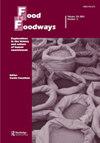烹饪和阿根廷文学中的女权主义
IF 1.1
Q2 ANTHROPOLOGY
引用次数: 1
摘要
本文通过三位阿根廷女作家的作品来分析女性与烹饪的关系。我发现了这个国家历史上的关键时刻,在这些时刻,烹饪实践代表了对性别斗争和妇女权利的更大反思。在阿根廷文学中,女性、烹饪和女权主义之间复杂而丰富的关系中,我区分了三个代表性案例:19世纪作家对食谱书的入侵;20世纪80年代的女权主义者,以及她们将烹饪语言作为政治和色情表达的方式;烹饪和食物是对当代文学中新的社会和性秩序的探索。在每个时期,我都专注于一个特定的作家和文学作品:胡安娜·马努埃拉·戈里蒂的《意外的意外》(1890),图努纳·梅尔卡多的短篇小说《Antieros》(1988),以及加布里埃拉Cabezón Cámara的《中国铁的冒险》(2017)。这些阿根廷作家提供了他们对南美烹饪的多元文化根源和习惯的了解,在其他叙事策略中,感官和欲望占主导地位,而不是对女性身体的理性处方。因此,作为一个语料库来分析,这些作者通过烹饪为我们提供了一个更广阔的女权主义实践的概念,并最终从一个地方的角度扩展了女权主义本身的多重意义。本文章由计算机程序翻译,如有差异,请以英文原文为准。
Cooking and feminism through Argentine literature
Abstract This essay analyzes women’s connections with cooking through the work of three female writers from Argentina. I uncover key moments in the history of the country in which culinary practices represent a channel for larger reflections on gender struggles and women’s rights. I distinguish three representative cases within the complex and rich relationship between women, cooking, and feminism in Argentine literature: the incursion of nineteenth-century writers in recipe books; the feminists of the 1980s and their use of the culinary language as a political and erotic expression; and cooking and food as an exploration of new social and sexual orders in contemporary literature. Within each period, I focus on a particular writer and literary work: Juana Manuela Gorriti’s Cocina ecléctica (1890), Tununa Mercado’s short story “Antieros” (1988), and Gabriela Cabezón Cámara’s Las aventuras de la China Iron (2017). These Argentine authors provide their knowledge on the diverse cultural roots and habits in South American cooking and give predominance to senses and desire over rational prescriptions on women’s bodies, among other narrative strategies. Thus, analyzed as a corpus, these authors give us a broader idea of feminist practices through cooking and, ultimately, expand multiple meanings of feminism itself from a local perspective.
求助全文
通过发布文献求助,成功后即可免费获取论文全文。
去求助
来源期刊

Food and Foodways
ANTHROPOLOGY-
CiteScore
2.20
自引率
0.00%
发文量
16
期刊介绍:
Food and Foodways is a refereed, interdisciplinary, and international journal devoted to publishing original scholarly articles on the history and culture of human nourishment. By reflecting on the role food plays in human relations, this unique journal explores the powerful but often subtle ways in which food has shaped, and shapes, our lives socially, economically, politically, mentally, nutritionally, and morally. Because food is a pervasive social phenomenon, it cannot be approached by any one discipline. We encourage articles that engage dialogue, debate, and exchange across disciplines.
 求助内容:
求助内容: 应助结果提醒方式:
应助结果提醒方式:


